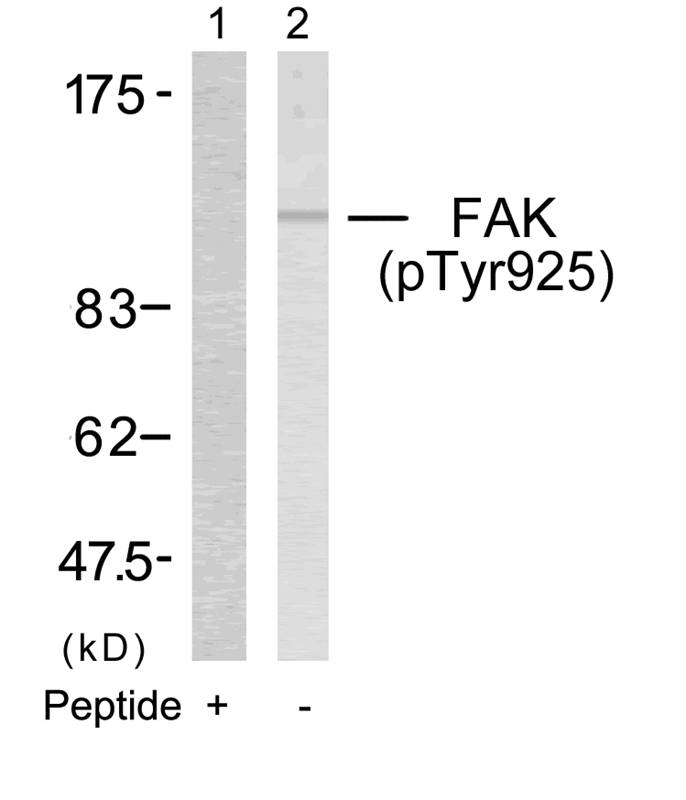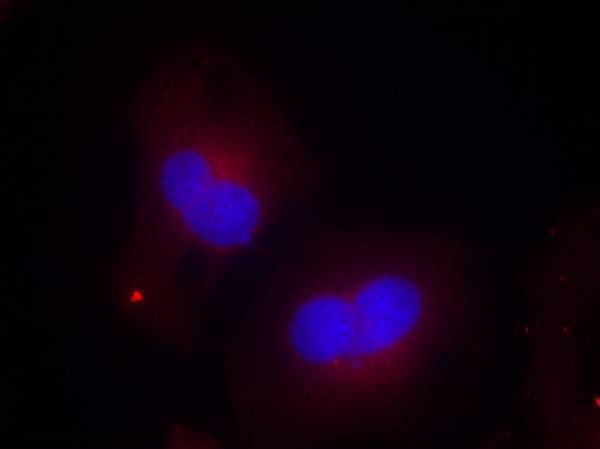

| WB | 咨询技术 | Human,Mouse,Rat |
| IF | 咨询技术 | Human,Mouse,Rat |
| IHC | 咨询技术 | Human,Mouse,Rat |
| ICC | 1/100-1/200 | Human,Mouse,Rat |
| FCM | 咨询技术 | Human,Mouse,Rat |
| Elisa | 咨询技术 | Human,Mouse,Rat |
| Aliases | FADK 1; FAK1; PTK2 |
| Entrez GeneID | 5747; |
| WB Predicted band size | 125kDa |
| Host/Isotype | Rabbit IgG |
| Antibody Type | Primary antibody |
| Storage | Store at 4°C short term. Aliquot and store at -20°C long term. Avoid freeze/thaw cycles. |
| Species Reactivity | Human,Mouse,Rat |
| Immunogen | Peptide sequence around phosphorylation site of tyrosine 925 (K-V-Y(p)-E-N) derived from Human FAK. |
| Formulation | Purified antibody in PBS with 0.05% sodium azide. |
+ +
以下是关于 **FAK (Phospho-Tyr925) 抗体**的3篇参考文献,按文献名称、作者和摘要内容简要概括:
---
1. **文献名称**:*"Integrin-mediated signal transduction linked to Ras pathway by GRB2 binding to focal adhesion kinase"*
**作者**:Schlaepfer, D.D. et al.
**摘要**:该研究揭示了FAK在整合素信号传导中的作用,Tyr925位点的磷酸化促使GRB2适配蛋白结合,进而激活RAS-MAPK通路,促进细胞迁移与增殖。文中通过Phospho-Tyr925抗体验证了该位点的功能。
2. **文献名称**:*"Focal adhesion kinase: in command and control of cell motility"*
**作者**:Mitra, S.K. & Schlaepfer, D.D.
**摘要**:这篇综述总结了FAK在细胞运动中的调控机制,指出Tyr925磷酸化通过招募下游信号分子(如GRB2)调控肿瘤侵袭和转移,相关研究依赖Phospho-Tyr925抗体的特异性检测。
3. **文献名称**:*"FAK in cancer: mechanistic findings and clinical applications"*
**作者**:Sulzmaier, F.J. et al.
**摘要**:文章探讨FAK在癌症中的分子机制,证实Tyr925磷酸化与肿瘤转移相关,并利用Phospho-Tyr925抗体在体内外模型中评估FAK抑制剂的效果,为靶向治疗提供依据。
---
以上文献均涉及FAK Tyr925磷酸化位点的功能研究,并明确使用了特异性抗体进行检测。如需更多实验细节,建议查阅原文方法部分。
Focal adhesion kinase (FAK), encoded by the PTK2 gene, is a cytoplasmic tyrosine kinase critical for signaling pathways regulating cell adhesion, migration, proliferation, and survival. Its activity is tightly controlled by autophosphorylation and phosphorylation at specific tyrosine residues. Phosphorylation at Tyr925 (Y925) in the FAK C-terminal domain is associated with interactions involving the Grb2/SOS complex, linking FAK to the RAS-MAPK pathway to promote cell migration and tumor invasion. This site becomes phosphorylated in response to integrin engagement, growth factor stimulation, or mechanical stress, reflecting FAK's role in mechanotransduction and extracellular matrix remodeling.
FAK (Phospho-Tyr925) antibodies are essential tools for detecting this activation-specific modification. They enable researchers to study FAK signaling dynamics in processes like cancer metastasis, angiogenesis, and tissue fibrosis. In cancer research, elevated Y925 phosphorylation correlates with increased cell motility and poor prognosis, making these antibodies valuable for assessing metastatic potential. They are widely used in techniques such as Western blotting, immunofluorescence, and immunohistochemistry to evaluate FAK activation status in cell lines, tissue samples, or preclinical models. Proper validation with phosphorylation-deficient mutants or phosphatase-treated samples is recommended to ensure specificity, as cross-reactivity with other phosphotyrosine epitopes may occur.
×